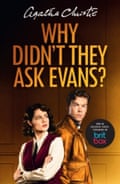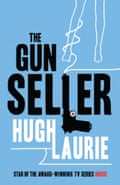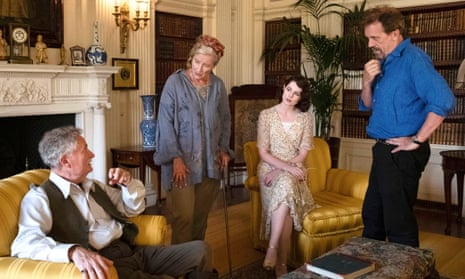It’s hard to take issue with Hugh Laurie, though that’s what I’m about to do.

Specifically, it’s hard to take issue with Hugh Laurie’s adaptation of Agatha Christie’s Why Didn’t They Ask Evans?. But one mystery remains unsolved – namely, why the series omits an exchange from the book, unless I missed it while my TV was buffering. It’s my favourite piece of Christie dialogue, one I think about most weekdays and one that should be stapled above the desk of every crossword setter and quiz writer.
“‘Why didn’t they ask Evans?’” Bobby repeated the phrase thoughtfully. “You know, I can’t see what on earth there can be in that to put the wind up anybody.”
”Ah! that’s because you don’t know. It’s like making crossword puzzles. You write down a clue and you think it’s too idiotically simple and that everyone will guess it straight off, and you’re frightfully surprised when they simply can’t get it in the least. ‘Why didn’t they ask Evans?’ must have been a most frightfully significant phrase to them, and they couldn’t realise that it meant nothing at all to you.”
“More fools they.”
Something similar applies in a whodunnit: if, at the end, the reader is told that the murderer was a tram driver who made a brief comic cameo in chapter 3, he or she won’t be reading any more by that author. And in a quiz, the whole business should be about getting people to enjoy recalling information they already possess.
The advice is hardest to follow when it comes to crosswords, especially cryptics. The setter can never un-see the answer, and there are many easy ways to be hard.
There’s obscurity. There are very few setters who haven’t found that a corner can only be filled if it includes either the name of a South Korean hamlet or an extinct species of spotted toad, and who, faced with having to unpick the grid-filling work, haven’t momentarily wondered whether solvers would be more likely to know the village or the toad.
Then there’s ambiguity. A solver might successfully work out which parts of a clue offer the wordplay and the definition, but remain unhappily stuck when running through words for something abstract such as “time” which, when reversed, give a term of abuse for a stupid person. There are so many such terms.
As a solver (one who seeks out the hardest puzzles but appreciates the easier ones), I most often run aground when trying to think of a synonym in order to decapitate it for the answer.
As a setter, I’ve sometimes forgotten the Evans advice. I’ll confess an example in the hope that other setters might be emboldened to do the same. It’s one where there is simply too much going on for the Everyman series, which has long been the go-to puzzle for beginners and lapsed or occasional solvers.
21d Describing New York, talk up sandwiches I saw (6)
[ wordplay: going around (‘describing’) abbrev. for ‘New York’, synonym for ‘talk’, both reversed (‘up’), the result containing (‘sandwiches’) I (‘I’) ]
[ NY in GAS, reversed, containing I ]
[ SAYNG containing I ]
[ definition: saw ]
As well as requiring an Ikea-style manual, none of the words “describing”, “talk up”, “sandwiches” and “saw” do what they appear to be doing in the natural reading of the sentence. The natural reading is why I wrote the clue; I seldom return from any major city without describing its sandwiches at length and I was blinded by what was to me an eminently plausible image.
But it was wrong and I’m sorry.

Two more thoughts about thrillers and whodunnits. First, I savoured Hugh Laurie’s description of Thomas Lang in his novel The Gun Seller (a blockbuster in France), recuperating in hospital by finishing puzzles in old editions of Woman’s Own and asking himself “a lot of questions”:
What was in it for me? What was in it for Woolf? What was in it for O’Neal and Solomon? Why were the crosswords half-finished? Had the patients got better, or died, before completing them? Had they come into hospital to have half their brain removed, and was this the proof of the surgeon’s skill? Who had ripped the covers off these magazines and why? Can the answer to ‘Not a woman (3)’ really be ‘man’?
Second, our next meeting of the crossword book club will be here in two weeks’ time; a reminder that our current reading is the hilarious Close Quarters by Michael Gilbert.
Find a collection of explainers, interviews and other helpful bits and bobs at alanconnor.com
The Shipping Forecast Puzzle Book by Alan Connor, which is partly but not predominantly cryptic, can be ordered from the Guardian Bookshop

Comments (…)
Sign in or create your Guardian account to join the discussion